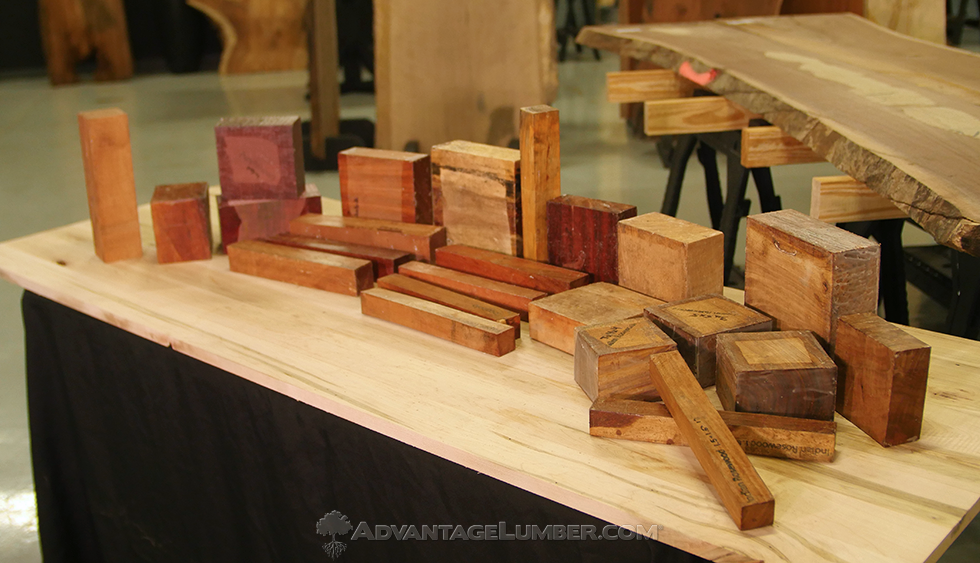Black Palm Turning Blanks

Black Palm Turning Blanks
Buy Online
All Turning Blanks
Shop NowBlack Palm Specs
- Scientific Name
- Borassus flabellifer
- Common Name(s)
- Black Palm, Palmyra Palm
- Distribution
- Tropical Asia and Africa
- Average Dried Weight
- 61 lbs/ft3 (970 kg/m3)
- Specific Gravity
- Basic: .79, 12% MC: .97
- Janka Hardness
- 2,020 lbf (9,000 N)
- Modulus of Rupture
- 19,950 lbf/in2 (137.6 MPa)
- Elastic Modulus
- 2,262,000 lbf/in2 (15.60 GPa)
- Crushing Strength
- 10,190 lbf/in2 (70.3 MPa)
- Shrinkage
- Radial: ~5.5%, Tangential: ~5.5%, Volumetric: ~11.0%, T/R Ratio: ~1.0 (Weight and hardness is for the higher-grade outer material, not the inner material.)
- Appearance
- Black fibers embedded in a lighter tan or light brown colored body. Fibers are more densely packed toward the outside of the tree trunk, becoming more and more sparse toward the center of the tree. The center core of the tree is soft and contains none of the darker vascular bundles that give the wood its characteristic look and hardness. (This is nearly opposite of the typical outer sapwood/inner heartwood combination found in dicot hardwoods.)
- Texture
- Black Palm has a medium to fine texture, though it is by no means even or uniform on account of the contrast between the dense, darker fibers, and the soft, lighter cellulose structure of the wood. Grain is very straight, and contains no growth rings, knots, or defects. Endgrain: Being a monocot, endgrain characteristics are non-typical when compared to more familiar hardwood dicots. Black Palm has a uniform distribution of black fibers embedded in a softer yellow/brown body of parenchyma. Growth rings, sapwood, and rays are completely absent. Endgrain exhibits a dotted pattern unique to palm trees.
- Rot Resistance
- Black Palm is reported to be durable regarding decay resistance, though it is susceptible to insect attacks.
- Workability
- Tends to be quite difficult to work with both machine and hand tools. The hard fibers contrast with the soft body of the wood, and can be brittle and splinter or pull out. Very sharp tools and correct cutting angles are required to get clean results. Applying a hardener or sanding sealer prior to final sanding/machining may help give a more homogenous density and reduce tearout. The lighter colored body of the wood tends to absorb larger quantities of finish, so care must be taken during finishing; a sanding sealer is recommended.
- Odor
- No characteristic odor.
- Allergies/Toxicity
- Palms in the Arecaceae family have been reported to cause skin irritation, and general constitutional effects.
- Pricing/Availability
- Although Black Palm trees can get up to several feet across, the center of the trunk is filled with a soft, unfigured portion, with only the outer areas of the trunk containing the characteristic colored fibers, so only narrow boards and spindle-stock are normally available. Prices for most sizes of Black Palm should be in the moderate range for an imported tropical wood.
- Sustainability
- This wood species is not listed in the CITES Appendices or on the IUCN Red List of Threatened Species.
- Common Uses
- Flooring, boatbuilding, walking sticks, knife and tool handles, rafters, furniture, and turned objects.
- Comments
- Technically neither a softwood nor a hardwood, palm falls into the category of monocots, which also includes bamboo, grass, banana, rice, wheat, corn, etc. (Monocot is short for monocotyledon, which simply means that the seed of the plant contains one leaf, rather than two as found in dicots.) Palm woods have no growth rings, and as a result, the shrinkage rate for drying the wood is more or less uniform between the radial and tangential surfaces, resulting in a T/R ratio of 1.0 and good dimensional stability. Bhilwara, Albizia odoratissima, is a medium sized hardwood species from SE Asia that can also be known as Ceylon Rosewood, Black Siris, and Kali Siris. Trees grow to a maximum height of 80 ft. and a maximum diameter of 48 to 55 inches. Bhilwara is one of the top nitrogen fixing species. It generally grows in the tropics but a few have been known to grow in temperate zones. The heartwood in Bhilwara wood is golden to dark brown/black with some alternating color stripes. It is a durable and dense hardwood that is good for woodworking projects as it works and finished well. It can be compared to Hawaiian Koa in look and workability.
Black Palm Turning Blank Prices
2.5″ x 2.5″ x 12″ Black Palm Turning Blank
$11.60
Buy Online
2″ x 2″ x 12″ Black Palm Turning Blank
$8.20
Buy Online


